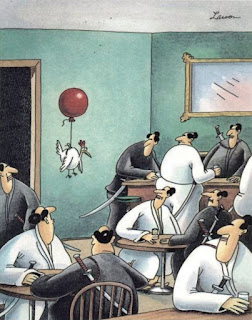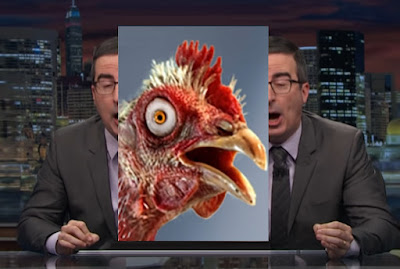.
I can't get this man-chicken to shut the h*ll up!
 |
| Oh, it's you. (Gary Larson) |
 |
| Discursive (monkey) thinking in average American |
 |
| Quick and easy techniques to calm anxious mind |
 |
| Big set up. The punchline is lying behind the cowboy's hindquarters. |
 |
| Look away, Monk, or you'll get no peace! |
What happens in a sitting meditation is very much affected by what we do for the other 23 or more hours of the day. By way of comparison, imagine owning a chicken. And once a day (alone) or once a week (in a group), we sit to meditate for an hour. What is the likelihood that that chicken is going to stay calm and quiet for an hour and not bother anyone? Next to none. But it all depends.
If anyone thinks a chicken is going to calm down because we tell it, "Calm down and shut up!" or attempt to beat, strangle, and chase it around the room, try to grab it by the neck and wrestle it to the mat, we must not know very many chickens.
They are nervous, inquisitive, territorial, bothersome, easily disturbed nuts. And once riled, it is almost impossible to get them to calm down again.
 |
| Training our chickens (minds) to fly effortlessly is meditation. |
But if we choke our chicken, yell at it, threaten it, grab it by the feathers and try to force it down, scream at it to shut the h*ll up, that will never work. It will only reflect what we are intending at it.
Now we may say, we don't have a chicken and we never will. But we do, and we always have. Only we call it a mind. That mind is much more sensitive than a chicken, much more reactive to our attitude towards it, much harder to settle and keep calm even for a minute. We can fake it until we make it, but "monkey mind" may drive us so crazy that we can't even fake it.
Then what are we doing? Berating it, treating it the way we were raised -- or at least all the bad ways in which we were raised: yelling, anger, punishment, threats, condemnation, criticism, dismissal, non-support. Whew, what a number our parents or caretakers did on us.
 |
| What were you expecting, Doctor, a chicken? - No, my Little Ducky, no. |
 |
| If only a detective were on hand to make sense of the clues. |
We have actually always been taught that one way to remain calm in the midst of the "slings and arrows" life hurls at us -- being hit with unpleasant words, sights, sounds, circumstances, or threats, or attitudes and shades and the sense that we are not liked or, worse yet, physical abuse -- is to slowly count to ten.
Well, what's the use of that if we have not in advance linked that counting to a calmer state.
 |
| I like life much better now that I'm not afraid you'll yell at me for anything wrong I might d. |
.
 |
| What comes first, calm or a calm-chicken? |
But the Silva Method of Mind Valley's Vivek, we can accustom our minds to associate that calm counting with an objective measure of calm, a more soothing brainwave state. Try it. And at all times everywhere for the whole week between group sits (but particularly at every solo sit), be nice to your chicken. Treat it as you would want to be treated in the best of circumstances.
If only we had a nice closing line to wrap it all up in a memorable way. "A happy wife, a happy life" or, in this case, "a foul fowl is a living howl," where "howl" means hell. "A happy hubby, a stubby chubby"? No, that one doesn't work. Got it! "A happy spouse, a peaceful house"! Yes, that's an original!
- It's a technicality, but things arise together. Paticca samuppada (Dependent Origination, Conditioned Co-Genesis, Conditionality) means things co-arise simultaneously. See Bhikkhu Bodhi, As It Is (tape series),
- Gary Larson (The Far Side); This is Part II by Meditation Instructor Seven, as told to Ananda (Dharma Buddhist Meditation), Jen Bradford, Moon, Wisdom Quarterly, from a Mind Valley commercial by Vivek Lakhani based on an idea, insight, and teaching by Jose Silva, author of Silva Mind Control.

























































































































































































































































No comments:
Post a Comment